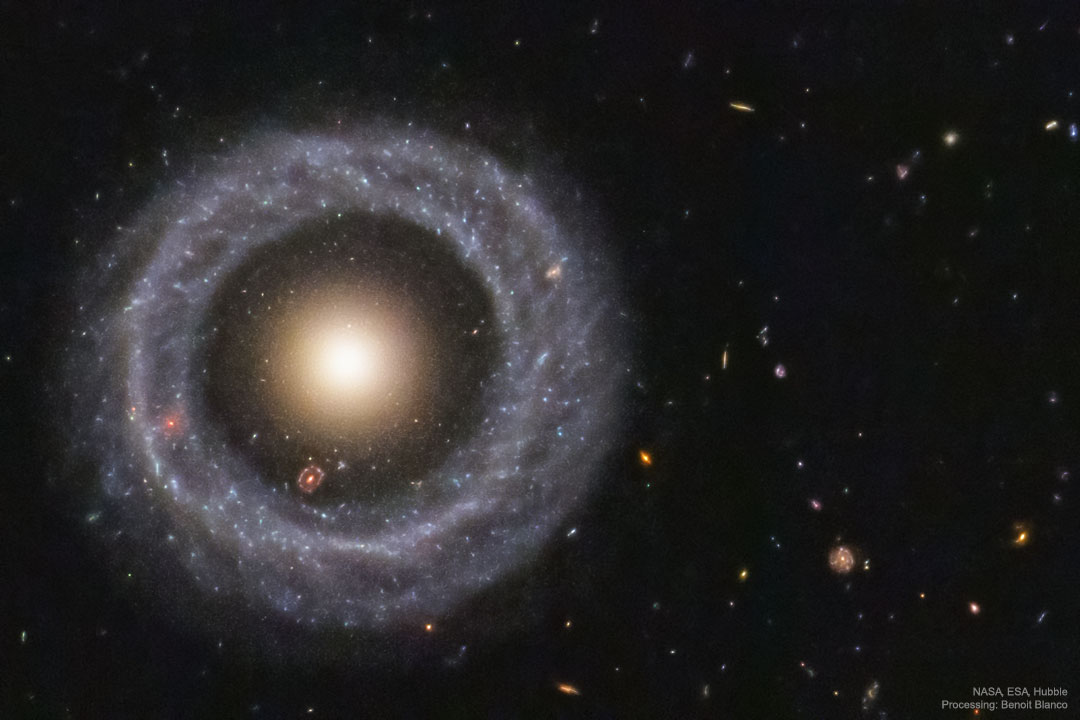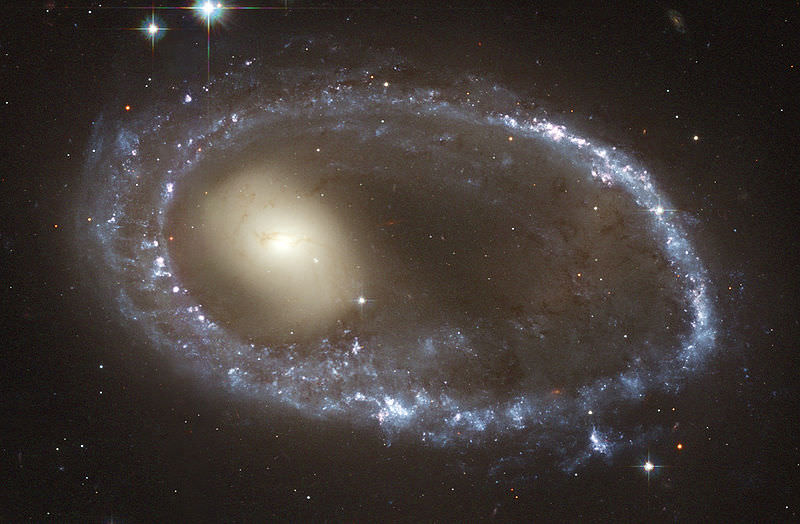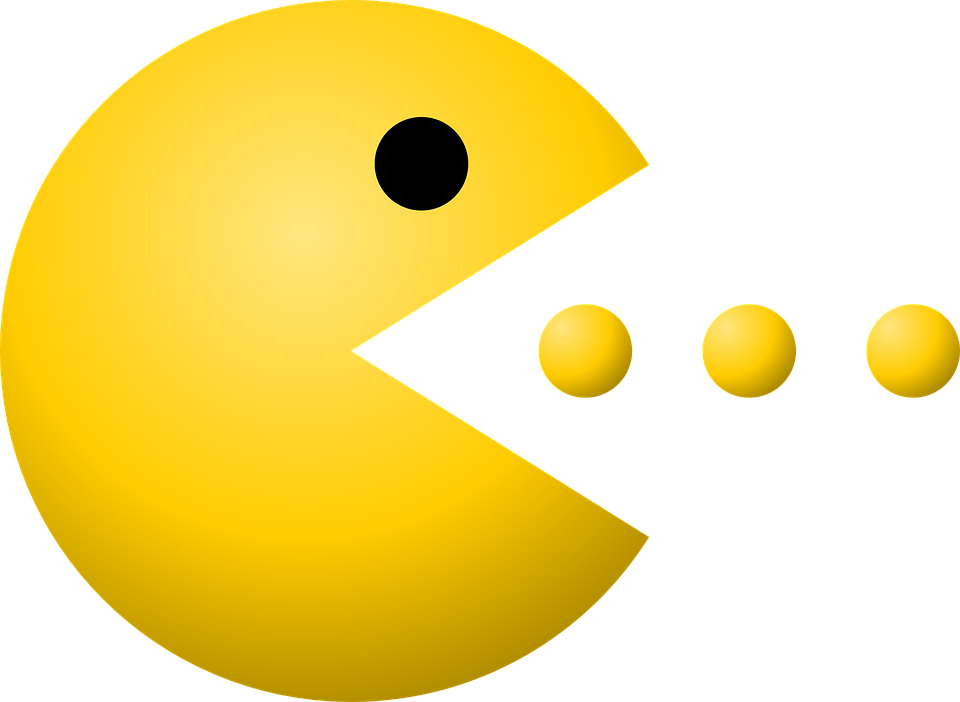Page 1 of 1
APOD: Hoag's Object: A Nearly Perfect... (2024 Feb 18)
Posted: Sun Feb 18, 2024 5:06 am
by APOD Robot
 Hoag's Object: A Nearly Perfect Ring Galaxy
Explanation:
Hoag's Object: A Nearly Perfect Ring Galaxy
Explanation: Is this one galaxy or two? This question came to light in 1950 when astronomer
Arthur Hoag chanced upon this unusual extragalactic object. On the outside is a
ring dominated by bright blue stars, while near the center lies a ball of much redder stars that are likely much older. Between the two is a
gap that appears almost completely dark. How
Hoag's Object formed, including its nearly
perfectly round ring of stars and gas, remains unknown. Genesis hypotheses include a
galaxy collision billions of years ago and the gravitational effect of a
central bar that has
since vanished. The
featured photo was taken by the
Hubble Space Telescope and reprocessed using an
artificially intelligent de-noising algorithm. Observations in
radio waves indicate that
Hoag's Object has
not accreted a smaller galaxy in the past billion years.
Hoag's Object spans about 100,000
light years and lies about 600 million
light years away toward the
constellation of the Snake (
Serpens). Many galaxies far in the distance are visible toward the right, while
coincidentally, visible in the gap at about seven o'clock, is another but more distant
ring galaxy.
Re: APOD: Hoag's Object: A Nearly Perfect... (2024 Feb 18)
Posted: Sun Feb 18, 2024 8:07 am
by Ann
Hoag's Object is, of course, so incredibly strange and fascinating.
I do think I can see orbital motion in the ring.
To see what makes Hoag's Object so strange, let's compare it with a few other ring galaxies. Let's start with a prototypical ring galaxy whose designation and photographer I don't know:
A barred ring galaxy has a nucleus, a bar and a ring.
The bar is divided in two parts, one on each side of the nucleus.
The bar ends typically touch the ring.
Compared with the prototypical barred ring galaxy, Hoag's Object has no bar, and no part of the ring appears to touch or have any connection with the "nucleus" (or rather, with the central elliptical body).
There is a whole zoo out there of ring galaxies! Let's look at a few:
What will happen to Mayall's Object? Is the intruder passing through with such speed and force that it is going to continue its journey away from its hapless ring-shaped victim? Will the ring-shaped component of Mayall's Object end up as Zwicky II 28, an apparently nucleus-less ring-shaped galaxy all on its own?
I have two thoughts on what could have caused the perfect shape of Hoag's Object. The first is a protoplanetary disk. When a planet forms in a protoplanetary disk, it clears out a perfect circular gap in the disk.
Well, Hoag's Object is perhaps somewhat similar to a protoplanetary disk, but not really...

But consider polar ring galaxy NGC 4650A. We see it from the side. If we saw it face on, would it resemble Hoag's Object? Maybe?
Ann
Re: APOD: Hoag's Object: A Nearly Perfect... (2024 Feb 18)
Posted: Sun Feb 18, 2024 11:16 am
by Rauf
Ann wrote: ↑Sun Feb 18, 2024 8:07 am
Hoag's Object is, of course, so incredibly strange and fascinating.
APOD 18 February 2024 annotated.png
I do think I can see orbital motion in the ring.
To see what makes Hoag's Object so strange, let's compare it with a few other ring galaxies. Let's start with a prototypical ring galaxy whose designation and photographer I don't know:
Anatomy of a barred ring galaxy.png
A barred ring galaxy has a nucleus, a bar and a ring.
The bar is divided in two parts, one on each side of the nucleus.
The bar ends typically touch the ring.
Compared with the prototypical barred ring galaxy, Hoag's Object has no bar, and no part of the ring appears to touch or have any connection with the "nucleus" (or rather, with the central elliptical body).
There is a whole zoo out there of ring galaxies! Let's look at a few:
What will happen to Mayall's Object? Is the intruder passing through with such speed and force that it is going to continue its journey away from its hapless ring-shaped victim? Will the ring-shaped component of Mayall's Object end up as Zwicky II 28, an apparently nucleus-less ring-shaped galaxy all on its own?
I have two thoughts on what could have caused the perfect shape of Hoag's Object. The first is a protoplanetary disk. When a planet forms in a protoplanetary disk, it clears out a perfect circular gap in the disk.
Well, Hoag's Object is perhaps somewhat similar to a protoplanetary disk, but not really...

But consider polar ring galaxy NGC 4650A. We see it from the side. If we saw it face on, would it resemble Hoag's Object? Maybe?
Ann
Fascinating Ann
 https://en.wikipedia.org/wiki/File:CN_AC118_108.png
https://en.wikipedia.org/wiki/File:CN_AC118_108.png
According to Wikipedia:
CN AC118 108 is a galaxy about 3760 million light-years away in Pandora's cluster. It has a peculiar ring shape. Picture by Hubble Space Telsecope.
3.76 billion light years away?? Blows my mind.
Re: APOD: Hoag's Object: A Nearly Perfect... (2024 Feb 18)
Posted: Sun Feb 18, 2024 11:48 am
by Ann
Rauf wrote: ↑Sun Feb 18, 2024 11:16 am
Fascinating Ann
 https://en.wikipedia.org/wiki/File:CN_AC118_108.png
https://en.wikipedia.org/wiki/File:CN_AC118_108.png
According to Wikipedia:
CN AC118 108 is a galaxy about 3760 million light-years away in Pandora's cluster. It has a peculiar ring shape. Picture by Hubble Space Telsecope.
3.76 billion light years away?? Blows my mind.
Thanks Rauf! You found it for me!

Ann
Re: APOD: Hoag's Object: A Nearly Perfect... (2024 Feb 18)
Posted: Sun Feb 18, 2024 2:33 pm
by johnnydeep
I love this beautiful odd ball (only 1/1000 galaxies are ring galaxies apparently), but I wish we had a better picture. Of course, it's more than 200 times farther away than Andromeda (600 Mly versus 2.5 Mly). How would this look to JWST I wonder?
Re: APOD: Hoag's Object: A Nearly Perfect... (2024 Feb 18)
Posted: Sun Feb 18, 2024 2:48 pm
by Roy
How do you fit these shapes into your dark matter conjecture?
Re: APOD: Hoag's Object: A Nearly Perfect... (2024 Feb 18)
Posted: Sun Feb 18, 2024 3:03 pm
by Chris Peterson
Roy wrote: ↑Sun Feb 18, 2024 2:48 pm
How do you fit these shapes into your dark matter conjecture?
AFAIK nobody has done the sort of radial velocity or gravitational lensing measurements that are used to map dark matter halos around galaxies. And nobody has developed a solid testable (or tested) hypothesis as to the mechanism by which ring galaxies form, and therefore it hasn't been modeled yet... with or without dark matter.
Re: APOD: Hoag's Object: A Nearly Perfect... (2024 Feb 18)
Posted: Sun Feb 18, 2024 7:05 pm
by Knight of Clear Skies
That's a spectacular collection of peculiar galaxies @Ann. Or should that be a peculiar collection of spectacular galaxies?
Re: APOD: Hoag's Object: A Nearly Perfect... (2024 Feb 18)
Posted: Sun Feb 18, 2024 7:15 pm
by johnnydeep
Knight of Clear Skies wrote: ↑Sun Feb 18, 2024 7:05 pm
That's a spectacular collection of peculiar galaxies @Ann. Or should that be a peculiar collection of spectacular galaxies?
Don't forget the spectacular collection of spectacular galaxies, and the peculiar collection of peculiar galaxies. Honestly, I'd like to see both of those collections as well!
Re: APOD: Hoag's Object: A Nearly Perfect... (2024 Feb 18)
Posted: Mon Feb 19, 2024 5:48 am
by Ann
johnnydeep wrote: ↑Sun Feb 18, 2024 7:15 pm
Knight of Clear Skies wrote: ↑Sun Feb 18, 2024 7:05 pm
That's a spectacular collection of peculiar galaxies @Ann. Or should that be a peculiar collection of spectacular galaxies?
Don't forget the spectacular collection of spectacular galaxies, and the peculiar collection of peculiar galaxies. Honestly, I'd like to see both of those collections as well!
I don't have a collection for you, Johnny, but I have a peculiar one for you, NGC 2537!
NGC 2537 is known as the Bear Claw galaxy. Did Ursa Major, the Big Bear, get lost on his way across the heavens and leave his paw print in another constellation? Possibly, because NGC 2537 is in Lynx, which is right next to the Big Bear!
Ann
Re: APOD: Hoag's Object: A Nearly Perfect... (2024 Feb 18)
Posted: Mon Feb 19, 2024 9:22 am
by JimB
Ann wrote: ↑Mon Feb 19, 2024 5:48 am
johnnydeep wrote: ↑Sun Feb 18, 2024 7:15 pm
Knight of Clear Skies wrote: ↑Sun Feb 18, 2024 7:05 pm
That's a spectacular collection of peculiar galaxies @Ann. Or should that be a peculiar collection of spectacular galaxies?
Don't forget the spectacular collection of spectacular galaxies, and the peculiar collection of peculiar galaxies. Honestly, I'd like to see both of those collections as well!
I don't have a collection for you, Johnny, but I have a peculiar one for you, NGC 2537!
Ann
Is that a figure of eight I see at 8 o'clock from the centre of NGC 2537??
And what about the smoke ring in the bottom right??
Re: APOD: Hoag's Object: A Nearly Perfect... (2024 Feb 18)
Posted: Mon Feb 19, 2024 10:29 am
by Ann
JimB wrote: ↑Mon Feb 19, 2024 9:22 am
Ann wrote: ↑Mon Feb 19, 2024 5:48 am
johnnydeep wrote: ↑Sun Feb 18, 2024 7:15 pm
Don't forget the spectacular collection of spectacular galaxies, and the peculiar collection of peculiar galaxies. Honestly, I'd like to see both of those collections as well!
I don't have a collection for you, Johnny, but I have a peculiar one for you, NGC 2537!
Ann
Is that a figure of eight I see at 8 o'clock from the centre of NGC 2537??
And what about the smoke ring in the bottom right??
They are photographic artifacts, probably reflections in the mirror of the telescope (but I'll leave it to Chris to describe the exact details

).
But the reflections look cool, don't they? Imagine if we could actually call the Bear Claw Galaxy the Figure Eight Galaxy instead!

Ann
Re: APOD: Hoag's Object: A Nearly Perfect... (2024 Feb 18)
Posted: Mon Feb 19, 2024 12:55 pm
by johnnydeep
Thanks, Ann. The peculiar "Bear Claw" galaxy sort of looks like one C-shaped galaxy about to swallow a smaller oblong one. Or maybe it's more of a single spiral that looks like a lowercase "e":
Re: APOD: Hoag's Object: A Nearly Perfect... (2024 Feb 18)
Posted: Mon Feb 19, 2024 1:26 pm
by Ann
johnnydeep wrote: ↑Mon Feb 19, 2024 12:55 pm
Thanks, Ann. The peculiar "Bear Claw" galaxy sort of
looks like one C-shaped galaxy about to swallow a smaller oblong one. Or maybe it's more of a single spiral that looks like a lowercase "e":
The Pacman galaxy?

Ann
Re: APOD: Hoag's Object: A Nearly Perfect... (2024 Feb 18)
Posted: Mon Feb 19, 2024 1:31 pm
by johnnydeep
Ann wrote: ↑Mon Feb 19, 2024 1:26 pm
johnnydeep wrote: ↑Mon Feb 19, 2024 12:55 pm
Thanks, Ann. The peculiar "Bear Claw" galaxy sort of
looks like one C-shaped galaxy about to swallow a smaller oblong one. Or maybe it's more of a single spiral that looks like a lowercase "e":
The Pacman galaxy?

Ann
Yeah, I thought of that comparison too. And we already have a Pacman Nebula, NGC 281:
 Hoag's Object: A Nearly Perfect Ring Galaxy
Hoag's Object: A Nearly Perfect Ring Galaxy













